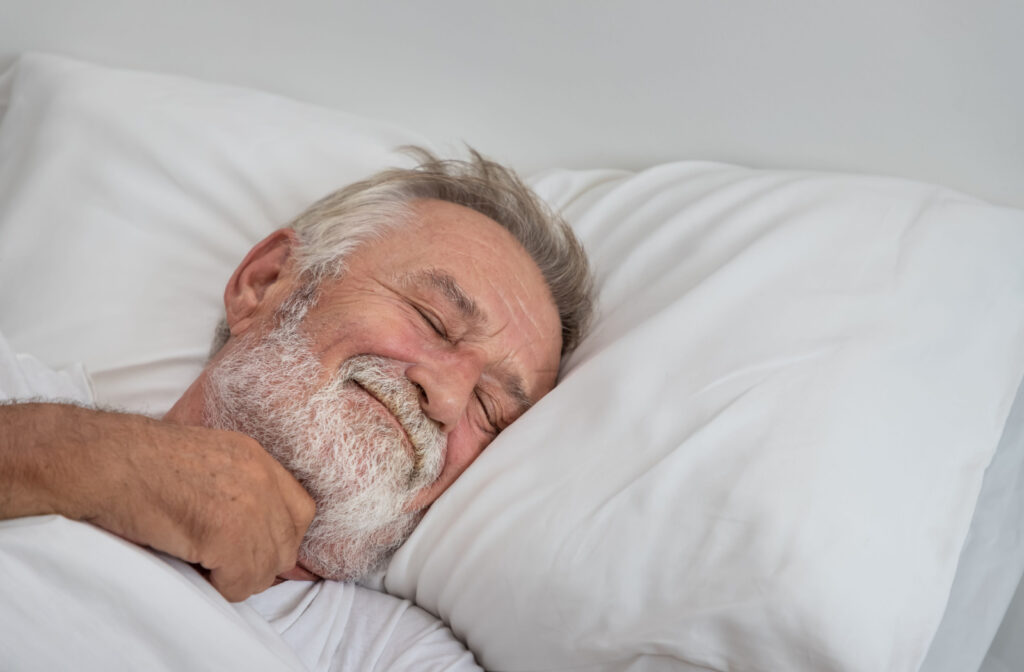If you’ve noticed that your parents or grandparents seem to sleep more than they used to, you’re not alone. Many seniors experience changes in their sleep habits as they age. But why do seniors sleep so much?
There are several scientific reasons why seniors may need more sleep than younger adults.
Changes in their natural sleep rhythm, health conditions, medication, mental well-being, and lifestyle factors can all affect how well the senior in your life is sleeping.
Creating a comfortable, soothing bedroom environment and changing their bedtime routine can help your loved one have more energy to enjoy activities, hobbies, and socializing during the day.
Changes in Sleep Patterns
As we age, our sleep patterns naturally change. Generally, seniors need as much sleep as younger adults, but they tend to wake up earlier in the morning, fall asleep earlier at night, and experience lighter sleep overall. It’s not uncommon for older adults to struggle to fall asleep and wake up more frequently throughout the night, often due to an inability to reach a deep sleep state.
This can be due to changes in their internal biological clocks and a decrease in the amount of deep sleep they get. As a result, seniors may need to sleep longer hours to make up for the lower quality of their sleep.
Health Conditions
Many common health conditions that affect seniors, such as arthritis, chronic pain, and heart disease, can make it challenging to get a good night’s sleep. Seniors may also experience sleep apnea, which causes breathing to stop and start during sleep, leading to daytime fatigue.
The relationship between sleep and your loved one’s physical health may be difficult to untangle because so many seniors are diagnosed with multiple health conditions. To manage these conditions, seniors may need to sleep longer to compensate for the rest they’ve missed during the night.
Medications
Almost 40% of adults over 65 take at least 5 different medications at once. Many prescription and over-the-counter medications can impact sleep. Medications prescribed to seniors for various medical conditions can cause drowsiness and fatigue. This can be especially true for pain medications, antidepressants, and benzodiazepines.
Different prescription medications can interact in complex ways to worsen sleep quality. If your aging loved one takes several medications, they may be experiencing a cumulative effect that causes them to sleep more overall.
Emotional Well-Being
Seniors may experience more emotional stress as they age due to changing life circumstances, such as retirement, loss of friends and loved ones, or chronic health conditions. This emotional stress can lead to depression or anxiety, which can, in turn, affect sleep quality.
Getting a rough night’s sleep can negatively impact your mental and emotional state. Disruption in the night from vivid nightmares, insomnia, or other sleep disorders can make your loved one more tired during waking hours. Seniors may need more sleep hours to compensate for the emotional distress they’re experiencing.
Lifestyle Factors
Diet, exercise, and daily routines can all affect sleep quality. Seniors who are more physically active during the day tend to sleep better at night, and those who consume a diet rich in vitamins and minerals may also experience better sleep quality. On the other hand, seniors who are more sedentary or eat a diet high in sugar and processed foods may experience more disrupted sleep.
Ultimately, seniors who prioritize healthy lifestyle habits are more likely to feel well-rested and energized throughout the day. By exercising regularly, eating a healthy diet, and making time for rest and relaxation, seniors can enjoy their golden years to the fullest.
How Seniors Can Get Better Quality Sleep
Seniors need to take steps to help them improve their sleep quality. Even if they have the coziest bedding and fluffiest pillows, seniors should also:
- Avoid caffeine in the afternoon
- Exercise regularly
- Have a set bedtime for a steady sleep schedule
- Maintain a bedtime routine to help wind down your mind and body
- Create a restful bedroom environment with minimal light and sound
Encourage your loved one to follow a regular sleep routine and create a quiet and comfortable sleep environment. Don’t hesitate to contact a medical professional if you have concerns about their sleep habits.
Sleep Soundly at The Villages of Farragut
If you have a loved one who seems to be sleeping more than usual, it’s important to consider all of these underlying factors. Addressing health conditions, managing medications, and promoting healthy lifestyle habits can help your aging loved one get the restful sleep they need to stay healthy and active.
Many older adults are sensitive sleepers, and when you’re touring the many floorplans at The Villages of Farragut, consider your loved one’s preferences for natural light and bedroom layout to help them get a comfortable, restful sleep. Schedule a visit to the community and view our varied floorplans to find the one that feels like home to your loved one.




